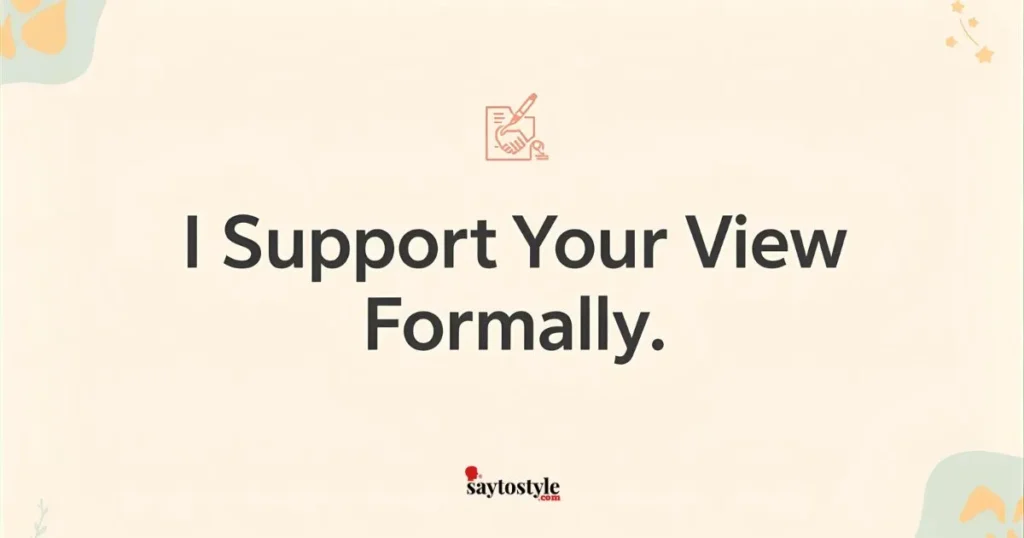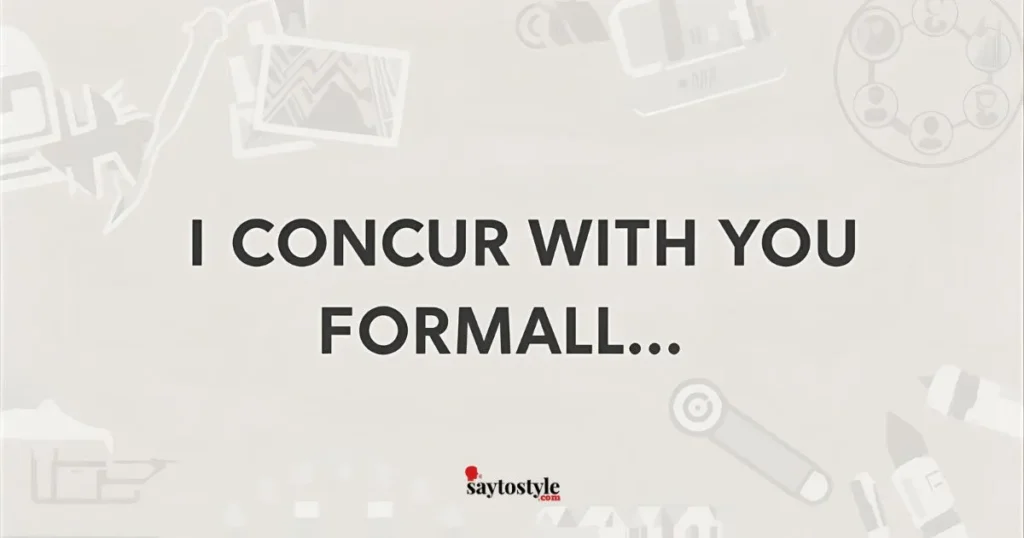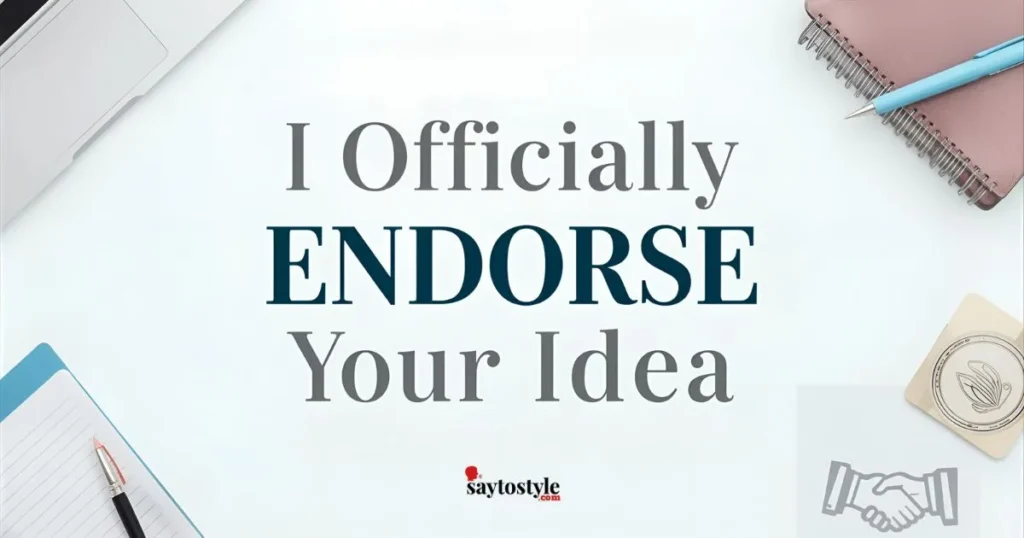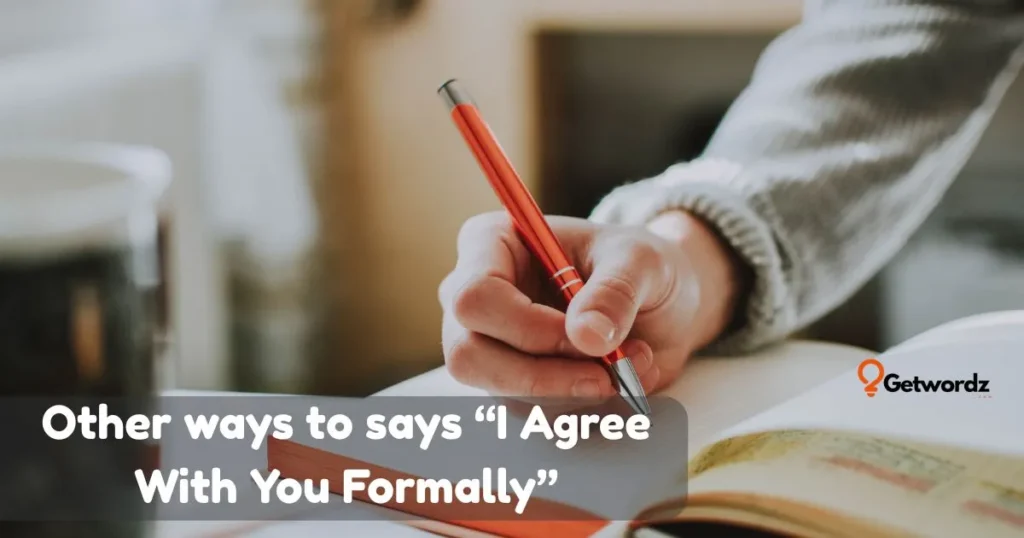Ever find yourself nodding in a meeting or drafting an email, wishing you could say “I agree with you formally” without sounding stiff or robotic? You’re not alone. Expressing agreement politely and professionally can be tricky, especially in professional or academic settings, where words carry weight. Using the same phrase repeatedly can feel dull, awkward, or even insincere.
This guide is designed to help you break that cycle. We’ll explore polished alternatives that convey alignment, shared perspective, and teamwork, while showing genuine respect and clarity. From acknowledging a valid point or confirming accuracy, to expressing support, endorsement, or wholehearted agreement with conviction, these phrases help you communicate effectively without losing authenticity.
Whether you want to concur, show complete agreement, or simply indicate that you share someone’s perspective, these options elevate your words and make your professional interactions more thoughtful, elegant, and memorable.
Say goodbye to repetitive responses and hello to expressions that make agreement feel natural and confident.
1. I Agree With You Formally
Scenario: In a professional meeting, your colleague presents a well-researched idea that aligns with your thoughts. You want to express agreement politely and officially.
Explanation: The phrase “I agree with you formally” communicates agreement in a respectful and professional tone. It’s a better way to say you concur than casual phrases like “I agree” or “Exactly,” and works well in emails, reports, or presentations.
Examples:
- “I agree with you formally; your plan aligns perfectly with our objectives.”
- “Thank you for your detailed input—I agree with you formally.”
- “I agree with you formally and recommend moving forward with this strategy.”
Why It Works:
This phrase balances professionalism and clarity, making it ideal for formal contexts where sincerity matters.
Read more: Other Ways to Say “As You Can See”!
2.I Fully Agree With You Formally
Scenario: During a strategic discussion, someone outlines a solution that perfectly matches your view. You want to show complete support in a polished manner.
Explanation: “I fully agree with you formally” emphasizes total alignment while remaining professional. It’s a creative alternative to simple agreement phrases, suitable for workplace or academic settings.
Examples:
- “I fully agree with you formally and support implementing your suggestions.”
- “After reviewing your proposal, I fully agree with you formally.”
- “I fully agree with you formally; your insight is invaluable.”
Why It Works:
The addition of “fully” conveys strong support and credibility, enhancing the impact of your agreement.
3.I Respectfully Agree With You
Scenario: You’re responding to a manager’s idea and want to show both agreement and deference.
Explanation: “I respectfully agree with you” conveys politeness and professionalism. It’s a unique expression that signals respect while maintaining alignment, perfect for emails, meetings, or formal communications.
Examples:
- “I respectfully agree with you and believe this approach will benefit the project.”
- “I respectfully agree with your assessment and recommend moving forward.”
- “I respectfully agree with you and appreciate your guidance on this matter.”
Why It Works:
Combining agreement with respect, this phrase stands out for formal discussions where tone matters.
4.I Concisely Agree With You Formally
Scenario: You need to approve a colleague’s idea in an email but want to keep it short and professional.
Explanation: “I concisely agree with you formally” is a precise, professional way to express alignment. It’s a better way to say you concur in official documents or brief messages.
Examples:
- “I concisely agree with you formally; your points are well-considered.”
- “I concisely agree with you formally and support the proposed changes.”
- “I concisely agree with you formally and will update the records accordingly.”
Why It Works:
This phrase is efficient, clear, and professional, ideal for business communication.
See Also: Other Ways to Say “Thank God”
5.I Acknowledge and Agree With You Formally
Scenario: In a team review, you want to validate someone’s idea while showing alignment.
Explanation: “I acknowledge and agree with you formally” conveys recognition and professional agreement. It’s a creative alternative that adds depth to standard agreement phrases.
Examples:
- “I acknowledge and agree with you formally; your insights are valuable.”
- “I acknowledge and agree with you formally and will incorporate your suggestions.”
- “I acknowledge and agree with you formally; your points strengthen our proposal.”
Why It Works:
Pairing acknowledgment with agreement adds sincerity and professionalism, making your response more impactful.
Read more: 30 Other Ways To Say “In Loving Memory” With Examples!
6.I Fully Endorse Your Opinion Formally
Scenario: During a board discussion, a colleague presents a well-reasoned opinion, and you want to show complete support.
Explanation: “I fully endorse your opinion formally” signals strong alignment and professional respect. It’s a unique expression that’s ideal for formal reports, presentations, or official emails.
Examples:
- “I fully endorse your opinion formally and will present it to the executive team.”
- “After careful review, I fully endorse your opinion formally.”
- “I fully endorse your opinion formally; your recommendation is sound.”
Why It Works:
This phrase demonstrates credibility and authority, making your agreement weighty and professional.
7.I Support Your View Formally

Scenario: In a meeting, someone proposes a plan, and you want to show backing without casual language.
Explanation: “I support your view formally” is a polished alternative that communicates approval and alignment. It’s a better way to express agreement in the workplace or official communications.
Examples:
- “I support your view formally and recommend proceeding with this plan.”
- “I support your view formally; your strategy is well thought out.”
- “I support your view formally and will inform the team accordingly.”
Why It Works:
It clearly communicates alignment and professionalism, making your stance respectful and authoritative.
8.I Endorse Your Proposal Formally
Scenario: Reviewing a colleague’s project proposal, you want to provide official backing.
Explanation: “I endorse your proposal formally” is a strong, professional way to show agreement. It’s a creative alternative to repetitive agreement phrases in formal contexts.
Examples:
- “I endorse your proposal formally and will submit it to management.”
- “I endorse your proposal formally; it aligns with our goals.”
- “I endorse your proposal formally and recommend immediate implementation.”
Why It Works:
The word “endorse” adds authority and credibility, making your agreement meaningful in professional settings.
9.I Am In Full Agreement Formally
Scenario: During a board meeting, a colleague outlines a proposal that perfectly matches your perspective. You want to express agreement professionally.
Explanation: “I am in full agreement formally” conveys strong alignment in a professional tone. It’s a creative alternative to plain agreement phrases, suitable for emails, reports, or official discussions.
Examples:
- “I am in full agreement formally and support your recommendation.”
- “After reviewing the report, I am in full agreement formally.”
- “I am in full agreement formally; this strategy aligns with our goals.”
Why It Works:
This phrase communicates complete support and professionalism, making your agreement clear and credible.
10.I Concur With You Formally

Scenario: A team member presents a well-thought-out idea, and you want to show agreement in a polished manner.
Explanation: “I concur with you formally” is a professional, concise way to express alignment. It’s a unique expression that adds sophistication to workplace or academic conversations.
Examples:
- “I concur with you formally and recommend we proceed.”
- “Based on your analysis, I concur with you formally.”
- “I concur with you formally; your points are well-argued.”
Why It Works:
“Concur” adds professional tone and authority, making your agreement feel thoughtful and deliberate.
Read more: 30 Other Ways To Say “Please Advise” With Examples!
11.I Affirm Your Point Formally
Scenario: During a presentation, someone highlights a key insight, and you want to validate it formally.
Explanation: “I affirm your point formally” expresses agreement and validation in a respectful manner. It’s a better way to say you agree in professional contexts without sounding casual.
Examples:
- “I affirm your point formally; it strengthens our overall strategy.”
- “I affirm your point formally and will support it in the report.”
- “I affirm your point formally; your observation is accurate.”
Why It Works:
Affirming a point combines agreement with validation, demonstrating respect and attentiveness.
12.I Support Your Argument Formally
Scenario: A colleague presents a well-reasoned argument in a debate or discussion, and you want to show backing professionally.
Explanation: “I support your argument formally” communicates alignment in a polished, professional tone. It’s a creative alternative for emails, presentations, or reports.
Examples:
- “I support your argument formally and will highlight it in our proposal.”
- “I support your argument formally; it aligns with our objectives.”
- “I support your argument formally and recommend moving forward with it.”
Why It Works:
This phrase emphasizes professional backing and thoughtful agreement, ideal for formal discussions.
13.I Endorse Your Statement Formally
Scenario: Reviewing a colleague’s written statement or report, you want to show official support.
Explanation: “I endorse your statement formally” signals formal approval and agreement. It’s better wording for professional emails or official communication.
Examples:
- “I endorse your statement formally and will circulate it to management.”
- “I endorse your statement formally; it reflects our team’s position accurately.”
- “I endorse your statement formally and recommend sharing it with stakeholders.”
Why It Works:
“Endorse” conveys credibility and authority, making your agreement strong and professional.
14.I Recognize and Agree With You Formally
Scenario: In a team meeting, a colleague presents a valid concern or suggestion, and you want to acknowledge it formally.
Explanation: “I recognize and agree with you formally” combines acknowledgment with professional agreement. It’s a unique expression that signals both attention and alignment.
Examples:
- “I recognize and agree with you formally; your points are insightful.”
- “I recognize and agree with you formally and will incorporate your suggestion.”
- “I recognize and agree with you formally; this approach is valid.”
Why It Works:
This phrase demonstrates attentiveness and professionalism, making your agreement feel sincere and respectful.
15.I Fully Appreciate and Agree Formally
Scenario: During a project review, someone provides a valuable perspective that aligns with your thinking.
Explanation: “I fully appreciate and agree formally” communicates gratitude and alignment in a professional tone. It’s a creative alternative for workplace emails and meetings.
Examples:
- “I fully appreciate and agree formally with your recommendation.”
- “I fully appreciate and agree formally; your analysis is thorough.”
- “I fully appreciate and agree formally and will support your suggestion.”
Why It Works:
This phrase conveys both respect and agreement, enhancing the impact of your response.
Read more: 30 Other Ways To Say “Safe Travels” With Examples!
16.I Officially Agree With You
Scenario: You want to confirm agreement in an official context, such as a formal email or report.
Explanation: “I officially agree with you” expresses alignment with a formal tone. It’s a better way to say you concur in workplace or professional documentation.
Examples:
- “I officially agree with you and will document this decision.”
- “I officially agree with you; your points are valid and actionable.”
- “I officially agree with you and recommend implementing your suggestion.”
Why It Works:
Adding “officially” gives authority and formality, making your agreement clear and professional.
17.I Wholeheartedly Agree With You Formally
Scenario: A colleague shares a well-thought-out plan, and you want to show complete professional agreement.
Explanation: “I wholeheartedly agree with you formally” emphasizes full support in a respectful and formal tone. It’s a creative alternative to casual agreement phrases.
Examples:
- “I wholeheartedly agree with you formally and will support your plan.”
- “I wholeheartedly agree with you formally; your recommendation is excellent.”
- “I wholeheartedly agree with you formally and will communicate it to the team.”
Why It Works:
This phrase conveys strong, sincere agreement, making your response impactful and professional.
18.I Am Aligned With Your View Formally
Scenario: In a strategy meeting, your ideas match a colleague’s, and you want to communicate alignment officially.
Explanation: “I am aligned with your view formally” signals professional agreement while emphasizing collaboration. It’s a better way to express concurrence in business settings.
Examples:
- “I am aligned with your view formally and support your strategy.”
- “I am aligned with your view formally; it aligns with our objectives.”
- “I am aligned with your view formally and will proceed accordingly.”
Why It Works:
This phrase demonstrates cohesion and professionalism, showing that you share the same perspective.
19.I Agree With Your Assessment Formally
Scenario: Reviewing a colleague’s evaluation, you want to confirm agreement in a polished manner.
Explanation: “I agree with your assessment formally” communicates professional concurrence and clarity. It’s a unique expression that works well in reports or emails.
Examples:
- “I agree with your assessment formally and recommend taking action.”
- “I agree with your assessment formally; it is accurate and well-presented.”
- “I agree with your assessment formally and will implement your suggestions.”
Why It Works:
It provides clear, professional validation, reinforcing credibility and thoughtfulness.
20.I Concur With Your Perspective Formally
Scenario: During a team discussion, a colleague presents a perspective that matches yours, and you want to respond formally.
Explanation: “I concur with your perspective formally” expresses professional agreement in a polished, respectful tone. It’s a creative alternative to simple “I agree.”
Examples:
- “I concur with your perspective formally and support your recommendation.”
- “I concur with your perspective formally; your approach is logical.”
- “I concur with your perspective formally and will communicate it to management.”
Why It Works:
This phrase adds authority and professionalism, signaling thoughtful alignment.
Read more: 30 Other Ways To Say “Sorry For Your Loss” With Examples!
21.I Am In Agreement With You Formally
Scenario: In a planning session, you want to express that your opinion aligns with a colleague’s in a professional way.
Explanation: “I am in agreement with you formally” communicates polite and formal agreement. It’s a better way to say you concur in workplace or academic contexts.
Examples:
- “I am in agreement with you formally and will proceed with your plan.”
- “I am in agreement with you formally; your strategy is sound.”
- “I am in agreement with you formally and will support your recommendation.”
Why It Works:
It is professional, clear, and versatile, ideal for meetings, emails, and reports.
22.I Support Your Recommendation Formally
Scenario: A teammate proposes a solution, and you want to show formal backing.
Explanation: “I support your recommendation formally” signals agreement and approval in a professional tone. It’s a creative alternative for official communication.
Examples:
- “I support your recommendation formally and will share it with the management team.”
- “I support your recommendation formally; it aligns with our goals.”
- “I support your recommendation formally and will take the necessary steps.”
Why It Works:
It demonstrates thoughtful approval and professionalism, giving your agreement weight.
23.I Validate Your Opinion Formally
Scenario: A colleague expresses an opinion during a formal discussion, and you want to validate it professionally.
Explanation: “I validate your opinion formally” communicates acknowledgment and alignment in a polished manner. It’s a unique expression that adds credibility.
Examples:
- “I validate your opinion formally and support its implementation.”
- “I validate your opinion formally; it is consistent with our objectives.”
- “I validate your opinion formally and will highlight it in our report.”
Why It Works:
Validating a point conveys professionalism and thoughtful agreement, enhancing your credibility.
24.I Officially Endorse Your Idea

Scenario: During a project meeting, someone presents a strong idea, and you want to show formal support.
Explanation: “I officially endorse your idea” communicates professional agreement with authority. It’s a better way to express support in emails or official documents.
Examples:
- “I officially endorse your idea and will present it to the management team.”
- “I officially endorse your idea; it aligns with our strategy.”
- “I officially endorse your idea and recommend immediate action.”
Why It Works:
The word “officially” adds credibility and authority, making your agreement impactful.
25.I Concur With Your Suggestion Formally
Scenario: A colleague provides a suggestion, and you want to respond in a professional, polished way.
Explanation: “I concur with your suggestion formally” expresses agreement with a respectful tone. It’s a creative alternative to simple “I agree.”
Examples:
- “I concur with your suggestion formally and will implement it.”
- “I concur with your suggestion formally; it makes sense for the project.”
- “I concur with your suggestion formally and will communicate it to the team.”
Why It Works:
It conveys thoughtful, professional alignment, suitable for formal discussions.
Read more: 30 Other Ways To Say “The End In a Story” With Examples!
26.I Approve Your Recommendation Formally
Scenario: In an official meeting, you want to confirm your approval for a colleague’s recommendation.
Explanation: “I approve your recommendation formally” signals official agreement and support. It’s better wording for emails, reports, and professional communications.
Examples:
- “I approve your recommendation formally and will notify the management team.”
- “I approve your recommendation formally; it aligns with company objectives.”
- “I approve your recommendation formally and will take necessary actions.”
Why It Works:
This phrase communicates official approval and professionalism, making your response authoritative.
27.I Stand With You Formally
Scenario: During a team debate, you want to show alignment with a colleague’s viewpoint in a professional tone.
Explanation: “I stand with you formally” expresses support and agreement politely. It’s a unique expression that adds weight to your professional stance.
Examples:
- “I stand with you formally and support your proposal.”
- “I stand with you formally; your strategy is solid and logical.”
- “I stand with you formally and will communicate my support to the team.”
Why It Works:
It combines agreement and backing, making your support visible and professional.
28.I Fully Support Your Position Formally
Scenario: A colleague explains a position in a discussion, and you want to express complete agreement.
Explanation: “I fully support your position formally” emphasizes strong alignment in a professional tone. It’s a better way to say you agree in formal settings.
Examples:
- “I fully support your position formally and will advocate for it.”
- “I fully support your position formally; it aligns with our objectives.”
- “I fully support your position formally and recommend moving forward.”
Why It Works:
This phrase conveys strong, professional support, making your agreement impactful and credible.
Other Ways to Say “Good Morning”
29.I Officially Agree With Your Proposal
Scenario: Reviewing a proposal, you want to provide formal confirmation of agreement.
Explanation: “I officially agree with your proposal” communicates professional approval and alignment. It’s a creative alternative to casual agreement phrases.
Examples:
- “I officially agree with your proposal and will submit it to management.”
- “I officially agree with your proposal; it reflects our goals.”
- “I officially agree with your proposal and recommend immediate action.”
Why It Works:
Adding “officially” signals authority and professionalism, making your agreement credible.
30.I Confirm My Agreement Formally
Scenario: In a formal meeting or email, you want to clearly communicate agreement.
Explanation: “I confirm my agreement formally” is a professional and polished way to express alignment. It’s a better wording for workplace or academic settings.
Examples:
- “I confirm my agreement formally and will support the proposed actions.”
- “I confirm my agreement formally; your points are well-reasoned.”
- “I confirm my agreement formally and will notify relevant stakeholders.”
Why It Works:
This phrase conveys clarity, professionalism, and authority, making your agreement unmistakable and credible.
31. I Echo Your Sentiments
Scenario: During a team discussion, a colleague expresses concern about project deadlines. You want to show that you share their perspective without sounding casual.
Explanation: “I Echo Your Sentiments” is a creative alternative to simply saying “I agree.” It conveys empathy and support in a formal tone, making it suitable for emails, presentations, or professional meetings. Using semantic terms like “affirmation” and “agreement” enhances search relevance.
Examples:
- I echo your sentiments regarding the importance of timely project delivery.
- I echo your sentiments and believe additional resources are necessary.
- In response to your concerns, I echo your sentiments fully.
Why It Works: The phrase emphasizes understanding and alignment. It feels professional, warm, and authoritative, making it an excellent choice for situations where you want to affirm without casual language.
32. As Agreed
Scenario: You’ve finalized details of a project with a client and want to confirm that everyone is on the same page.
Explanation: “As Agreed” is a concise and formal way to reinforce prior consensus. It works as a strong alternative to “we’re in agreement” and fits well in emails, contracts, or meeting notes. Using this phrase signals professionalism and confirms shared understanding.
Examples:
- As agreed, the report will be submitted by Friday.
- The budget allocation will follow as agreed in our last meeting.
- We will proceed with the plan as agreed.
Why It Works: Its brevity and clarity make it powerful. It shows alignment, decisiveness, and professionalism in a business context.
Explore: Other Ways To Say “My Name is”
33. In Accordance With
Scenario: You are reviewing a company policy with a new employee and want to show that your actions align with official guidelines.
Explanation: “In Accordance With” is a formal expression commonly used in legal, corporate, or academic writing. It’s a better way to say “following the rules” while keeping the tone professional and authoritative.
Examples:
- In accordance with company policy, all employees must complete training annually.
- The project timeline has been adjusted in accordance with client feedback.
- In accordance with industry standards, we’ve implemented new safety measures.
Why It Works: It emphasizes professionalism and compliance. It signals that your agreement is based on established protocols, adding credibility to your communication.
34. Affirmative Response
Scenario: A manager asks if you approve a proposed schedule for the upcoming quarter, and you want to respond formally without hesitation.
Explanation: “Affirmative Response” is a clear, formal, and slightly authoritative way to convey agreement. It’s a unique expression suitable for professional emails, memos, or formal conversations.
Examples:
- Your proposed timeline has received an affirmative response.
- We provide an affirmative response to your request for additional resources.
- An affirmative response has been issued regarding the new policy.
Why It Works: It’s concise and unambiguous. The phrase emphasizes clarity and decisiveness, giving your agreement a professional weight.
35. Approved With Thanks
Scenario: A colleague submits a project draft for review, and you want to give formal approval while showing gratitude.
Explanation: “Approved With Thanks” is a polished alternative to “I agree” that combines affirmation with appreciation. It works well in emails, reports, and internal communication.
Examples:
- Your draft has been approved with thanks for your hard work.
- The revised schedule is approved with thanks; we can proceed.
- Approved with thanks, your suggestions will be implemented immediately.
Why It Works: It balances professionalism with warmth. It conveys acknowledgment, respect, and formal approval in one phrase.
Discover: Other Ways to say “Make a Difference”
36. I Respect Your Decision
Scenario: During a meeting, a team member proposes a strategy different from yours, and you want to show support for their choice without necessarily endorsing it fully.
Explanation: “I Respect Your Decision” is a formal, polite way to acknowledge someone’s choice. It’s a unique wording to express agreement in principle while maintaining a professional tone.
Examples:
- I respect your decision and will support the implementation.
- While I had a different perspective, I respect your decision.
- I respect your decision and am ready to provide assistance.
Why It Works: This phrase shows professionalism and emotional intelligence. It acknowledges the other person’s authority and perspective while signaling cooperative intent.
37. That Is Fine With Me
Scenario: A colleague suggests rescheduling a meeting, and you want to formally signal your agreement without overexplaining.
Explanation: “That Is Fine With Me” is simple, polite, and formal. It’s a creative alternative to casual agreement phrases and works in professional emails or verbal discussions.
Examples:
- That is fine with me; we can shift the meeting to Thursday.
- Your proposal for task delegation is fine with me.
- That is fine with me; please proceed as planned.
Why It Works: It’s concise, clear, and respectful. The phrase works across various formal and semi-formal settings, making it flexible.
Learn More: Other Ways to say “I Believe in You”
Pros and cons of Using “I Agree With You Formally”
pros
- Professional Tone: Conveys agreement in a polished and respectful manner, ideal for workplace and academic settings.
- Clarity: Clearly communicates alignment without ambiguity, making your message easy to understand.
- Credibility: Adds authority and professionalism to your response, especially in formal discussions or emails.
- Versatility: Can be used in various contexts—meetings, emails, reports, or official documents.
- Politeness: Balances agreement with respect, enhancing your interpersonal communication.
Cons
- Too Formal for Casual Conversations: May sound stiff or unnatural in friendly or casual discussions.
- Potential Overuse: Frequent use can make communication seem repetitive in professional settings.
- Lengthy Phrase: Slightly longer than simple alternatives like “I agree” or “Exactly.”
- Limited Emotional Expression: Doesn’t convey enthusiasm or warmth compared to casual alternatives.
- May Sound Detached: In personal or informal contexts, it might feel distant or overly bureaucratic.
Closing words
“I Agree With You Formally” offers readers a polished and professional way to express agreement, going beyond repetitive or casual phrases. This post has explored fresh alternatives, creative expressions, and unique wording that make your responses feel thoughtful and authoritative. By using these options, you can avoid overused agreement phrases while maintaining a respectful and professional tone.
These alternatives work perfectly in various scenarios, whether communicating with colleagues in meetings, responding to professional emails, or sharing thoughtful input on social media. Each phrase provides different ways to say you concur, offering fresh wording and creative alternatives for every situation.
Try incorporating one of these expressions in your next message or email to make your agreement stand out. Using such professional phrases enhances clarity, authenticity, and impact in your communication.
Ultimately, “I Agree With You Formally” empowers you to convey agreement with sincerity and professionalism, leaving a lasting impression while strengthening your credibility.




